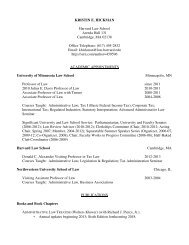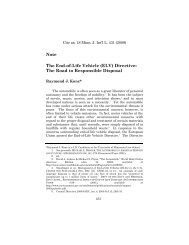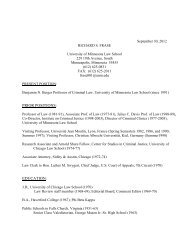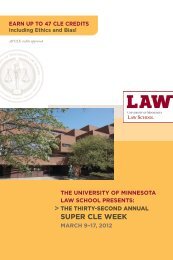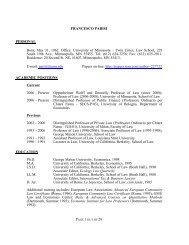Enabling Private Ordering - the University of Minnesota Law School
Enabling Private Ordering - the University of Minnesota Law School
Enabling Private Ordering - the University of Minnesota Law School
Create successful ePaper yourself
Turn your PDF publications into a flip-book with our unique Google optimized e-Paper software.
2009] UMBRELLA CLAUSES 79<br />
subject to a compensation requirement.<br />
2. The State’s Power to Interfere with State Contracts under<br />
Domestic <strong>Law</strong>s<br />
The power <strong>of</strong> <strong>the</strong> State to modify or terminate a contract<br />
with an individual in <strong>the</strong> public interest has also been accepted<br />
in <strong>the</strong> major domestic legal systems, lending fur<strong>the</strong>r support to<br />
<strong>the</strong> conclusion that <strong>the</strong> power <strong>of</strong> <strong>the</strong> State to interfere with<br />
investor-State contracts in <strong>the</strong> public interest constitutes a<br />
general principle <strong>of</strong> law. 217 French administrative law, for<br />
example, recognizes that <strong>the</strong> administration is entitled, if not<br />
required, to unilaterally modify so-called contrats administratifs<br />
in <strong>the</strong> public interest, subject to <strong>the</strong> payment <strong>of</strong> compensation. 218<br />
Similarly, English law has accepted that <strong>the</strong> State has <strong>the</strong><br />
power to modify or terminate contracts to which it is a party if a<br />
superseding public interest is at play. Following <strong>the</strong> leading<br />
case, Rederiaktiebolaget Amphitrite v. The King, English courts<br />
consider that “it is not competent for <strong>the</strong> Government to fetter<br />
its future executive action, which must necessarily be<br />
determined by <strong>the</strong> needs <strong>of</strong> <strong>the</strong> community when <strong>the</strong> question<br />
arises. It cannot by contract hamper its freedom <strong>of</strong> action in<br />
matters which concern <strong>the</strong> welfare <strong>of</strong> <strong>the</strong> State.” 219 Even though<br />
Question <strong>of</strong> Unilateral Change by <strong>the</strong> State in Contemporary International <strong>Law</strong>, 9 J.<br />
INT’L ARB., Dec. 1992, at 141, 145 (1992) (“The public interest requires that <strong>the</strong><br />
governmental authority be empowered to carry out continuous supervision over <strong>the</strong><br />
execution <strong>of</strong> <strong>the</strong> contract and it also authorizes <strong>the</strong> governmental authority to<br />
undertake certain unilateral powers: to suspend, vary or rescind <strong>the</strong> contract, to<br />
transfer it to ano<strong>the</strong>r party, or to take it over itself. The public interest not only<br />
authorizes <strong>the</strong> governmental authority to exercise powers, but also places it under a<br />
duty to exercise such powers as part <strong>of</strong> its responsibility to <strong>the</strong> public.”) (emphasis<br />
added); Weil, supra note 3 at 101, 217 et seq. Cf. Colin C. Turpin, Public Contracts,<br />
in VII INTERNATIONAL ENCYCLOPEDIA OF COMPARATIVE LAW 38 (Konrad Zweigert &<br />
Ulrich Drobnig eds., 1981) (“The prerogatives <strong>of</strong> <strong>the</strong> administration commonly<br />
include a power <strong>of</strong> unilateral variation <strong>of</strong> <strong>the</strong> conditions <strong>of</strong> <strong>the</strong> contract, such that <strong>the</strong><br />
contractor may be required to perform more expeditiously, render different services,<br />
conform to different specifications, or o<strong>the</strong>rwise depart from <strong>the</strong> original stipulations<br />
<strong>of</strong> <strong>the</strong> contract.”) (emphasis added).<br />
216. See also Maniruzzaman, supra note 215215, at 146–59. Cf. DOLZER, supra<br />
note 54, at 213 et seq.; Rudolf Dolzer, Indirect Expropriation <strong>of</strong> Alien Property, 1<br />
ICSID REV. 41 (1986) (regarding <strong>the</strong> interaction between domestic legal systems and<br />
general principles <strong>of</strong> law as a way to clarify customary international law as well as<br />
treaty law).<br />
217. Conseil d’Etat [CE] Decisions <strong>of</strong> March 11, 1910 - Compagnie générale<br />
française des tramways; Conseil d’Etat, Decisions <strong>of</strong> Feb. 2, 1983 - Union des<br />
Transports publics.<br />
219. Rederiaktiebolaget Amphitrite v. The King, [1921] 3 K.B. 500, 503; see also




